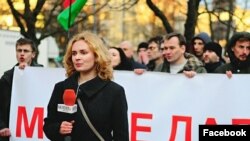Belarusian journalist Catarina Andreeva, who is serving a two-year prison sentence for covering protests against authoritarian ruler Alexander Lukashenko, has now been charged with high treason just ahead of her release.
Andreeva's husband, Ihor Ilyash, wrote on Facebook on April 7 that it remains unclear what the charge is based on, adding that the investigations into what he called "an absurd" case had been finished and the case will be soon handed to a court.
"Just five months before the end of her prison term, all of a sudden, they charge her again, this time with 'high treason.' In a country engulfed with totalitarian insanity, this cannot have anything to do with law and reality. But there is obvious parallel with Stalin's practices—to extend a political prisoner's term, when it approaches its end," Ilyash wrote, adding that his wife "is absolutely innocent."
"The cynical nature of this probe is a monstrous retaliation against someone for their journalistic activities," he adds.
Andreeva and her colleague, Darya Chultsova, were both sentenced to two years in prison in February 2021 after a court found them guilty of "organizing public events aimed at disrupting civil order."
Andreeva, 28, and Chultsova, 24, in their last statement in the courtroom, rejected the charge against them, calling them politically motivated, as they attended the protest to do their job as reporters.
The two journalists were arrested in mid-November 2020 while they were covering a rally in Minsk in memory of Roman Bandarenko.
Bandarenko died from injuries sustained in a vicious beating by a group of masked assailants—who rights activists say were affiliated with the authorities—during one of the weekly rallies demanding Lukashenko's resignation after he claimed victory in an August 2020 presidential election that the opposition says was rigged.
Belarusian and international human rights organizations have recognized Andreeva and Chultsova as political prisoners and say that all charges should be dropped and they should be released immediately.
Security officials have cracked down hard on any dissent against Lukashenko's regime, arresting thousands, including dozens of journalists who covered the rallies, and pushing most of the top opposition figures out of the country.
Several protesters have been killed in the violence and some rights organizations say there is credible evidence of torture by security officials of some of those detained.
Lukashenko, who has run the country with a tight grip since 1994, has denied any wrongdoing with regard to the election and refuses to negotiate with the opposition on stepping down and holding new elections.
The European Union, United States, Canada, and other countries have refused to recognize Lukashenko, 67, as the legitimate leader of Belarus and have slapped him and senior Belarusian officials with sanctions in response to the "falsification" of the vote and the brutal post-election crackdown.




